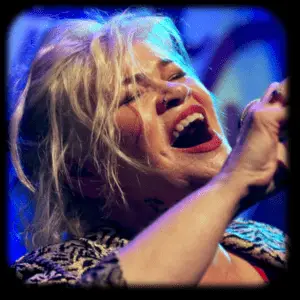Karen Lovely

Feeling the bad
“This Blues ain’t nothing but a good man feeling bad.”
This oft-repeated quote tells a great deal about the cathartic power of the blues and the reason for the genre’s enduring popularity. It also tells a great deal about why some voices have risen to the top. One of those voices belongs to a breathtakingly gifted woman named Karen Lovely.
Lovey has this to say about the genre’s ability to make the singer feel whole again. “Singing is everything! Physically, I will go into withdrawal if I go too long without singing. It is catharsis for me, especially the live performances.”
To anyone unfamiliar with the overwhelming power of an expressive voice singing from a place of sadness, a quick listen to Karen Lovely’s “Never Felt no Blues” would serve a crash course.
Karen isn’t content to simply shout her way through heartbreak. She begins the song with a barely alive whimper and slowly works her way up to a crescendo of rage, sorrow and regret. The song tells you everything you need to know about Karen Lovely, and everything you need to know about the blues.
But it is often helpful to dig beneath the surface of a song – however stunning that surface may be – to learn more about what actually drives a singer
Healing the bad
If healing is a key part of the tradition of the blues Karen Lovely seems on a mission to extend this tradition into the digital age. Part of this can be seen in the way she embraces the wide range of age found in the audience. She says, “The blues community doesn’t shut out older people, we embrace them. It is music for people who really care about music”
But Karen’s commitment to social causes goes deeper. For each of her albums, she dedicates songs that specifically deal with social issues she cares about deeply. Among the many topics she’s addressed are “Domestic violence, homelessness, addiction, suicide and mental illness.
“I am trying to not just raise awareness, but to also provide avenues for people to get help and to learn to recognize when people do in fact need help. I see homelessness in a different way due to my experiences. As an artist, I am blessed to have a platform to reach people, to help build a world of zero tolerance, to offset some of the darkness out there.”
Never Felt No Blues
Drawing on the past
Karen’s sense of compassion when it comes to issues such as homeless and domestic violence actually comes from a surprisingly personal place. As a younger struggling musician, she had the kinds of financial difficulties that are sadly common among young artists. For a time, she was homeless. “It is easier to end up homeless than anyone could ever imagine.”
During this trying time she developed a kindness for people across a wide spectrum, including her fellow musicians, saying, “Most of us know we are a paycheck away from living on the streets, unless you have good resources like family and friends.” While narrowing the conversation to those of her chosen genre, Karen adds, “I’m sure there are a few out there, but I don’t know any rich blues musicians. We struggle to get by like everyone else.”
Recommended Album
Although she’s released a number of CDs before, Fish Outta Water probably does the best job of introducing a casual blues fan to Lovey’s stunning voice. For that matter, it wouldn’t be a bad introduction to the blues for a beginner. The album features a wide range of blues subgenres. Twist my Fate has a honky-tonk feel. Waking up the Dead features a rural, almost country-blues feel, and others are simply raw, backwoods blues, the kind that Karen’s voice operates best under.
The backing tracks manage to give Lovely’s voice the polish it needs without taking away from the rawness needed in the blues. Everything here works beautifully.
Fish Outta Water
As an Amazon Associate I earn from qualifying purchases.
Making a lovely difference
With several solo albums releases under her belt, Karen Lovely has done a lot of good by feeling bad. As an activist, she’s raised both money and awareness of issues everyone should know about. But she’s also helped fans of the blues understand that such compassion isn’t an entirely new idea in the blues.
Her CD Prohibition Blues features covers of classic blues songs originally made famous by such luminaries as Bessie Smith, Ma Rainey, Ethel Waters and others.
By hearkening back to the blues’ golden age, Karen Lovely makes it clear that strong women singing without fear is a blues tradition that started well before feminist hashtags.
